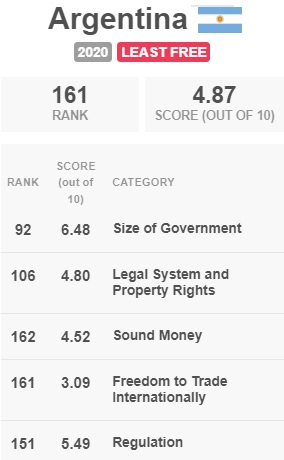Last month, a plurality of Argentinians voted for a libertarian in their nation’s presidential primary. This shocking result may be an sign that voters have sobered up and realized that they have “run out of other people’s money.”
This video from The Economist explains the country’s economic challenges.
For what it’s worth, The Economist is not a libertarian-friendly publication. So it is especially remarkable and noteworthy that the video clearly explains that Argentina’s problems are the result of statism (the country has the world’s fifth-lowest score for economic liberty).
- Too much spending.
- Too much protectionism.
- Too much redistribution.
- Too much regulation.
- Too much money printing.
Argentina’s economic misery is not a surprise to anyone who has paid attention, as I explained in Part I of this series.
The situation is tragic. Argentina used to be one of the world’s richest nations. Unfortunately, it has suffered from varying degrees of Peronism since World War II (occasional right-of-center governments often are just as bad as the Peronists).
As a result, Argentina has suffered a massive decline in relative living standards.
One reason for decades of bad policy is that the bureaucrats at the International Monetary Fund have a terrible track record of rewarding Argentina when it gets in fiscal trouble (22 bailouts so far!).
The IMF’s bureaucrats seem to think that “moral hazard” is a good thing rather than a bad thing.
So what’s the main lesson to be learned? In part, it will be good if Argentinian voters reject Peronism later this year in their presidential election. But I worry that won’t be enough if international bureaucracies like the IMF continue to play a malignant role.


